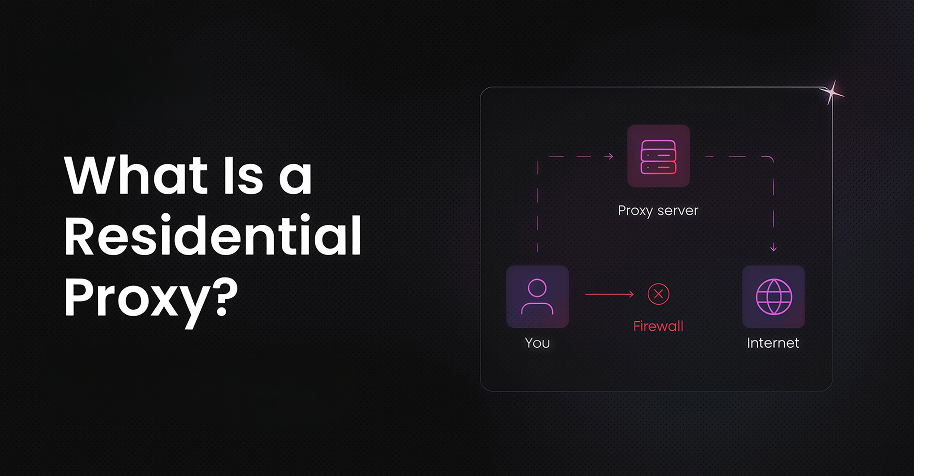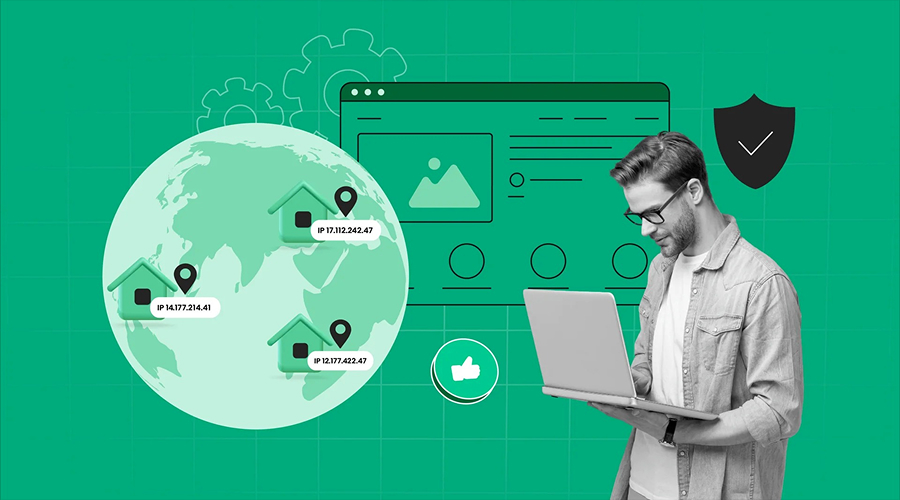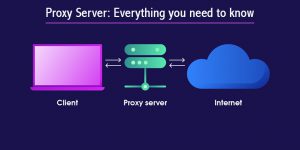
A residential proxy is a type of proxy server that routes your internet traffic through real devices, such as personal computers or mobile phones, connected to genuine internet service providers (ISPs). Unlike datacenter proxies, which operate on virtual servers, residential proxies use authentic IP addresses assigned to households. This makes them appear natural to websites, as if a regular user is browsing. Because of their authenticity, residential proxies are highly valuable for businesses, researchers, and individuals who need reliable, undetectable connections.
When you access a website through a residential proxy, the site sees the request as coming from a legitimate household rather than a server farm. This authenticity is why residential proxies are often considered the gold standard for online tasks that require discretion and accuracy. But why does this matter so much, and how can you benefit from it? Let’s break it down.
Why businesses and individuals use residential proxies
One of the main reasons people turn to residential proxies is credibility. If you’ve ever been blocked while shopping online, scraping product data, or running multiple accounts on platforms, you’ve experienced the frustration of being flagged as “suspicious.” Residential proxies significantly reduce these issues because they look like ordinary traffic from real users.
These proxies also help in research and data gathering. For example, businesses conducting competitor analysis or tracking global e-commerce prices need accurate information that isn’t distorted by location-based restrictions. Residential proxies allow them to access websites as if they were browsing locally from different cities or countries, ensuring they see the true picture.
For individuals, they provide stable and secure browsing experiences. Students researching foreign sources, marketers testing geo-targeted ads, or gamers connecting to international servers can all benefit from residential proxies without the fear of interruptions.
Key benefits of residential proxies

Residential proxies are not just about bypassing technical hurdles; they add real value to digital operations. Let’s highlight the most important advantages:
- Authenticity: Websites treat residential IPs as real users, reducing the chance of detection.
- Geo-targeting: You can access content as if you are browsing from specific regions or countries.
- Stability: Unlike datacenter proxies, they are less likely to be blacklisted or throttled.
- Scalability: Businesses can manage multiple accounts or projects at the same time.
- Security: By masking your original IP, they reduce risks tied to exposing personal or business networks.
These advantages make residential proxies particularly valuable in industries like digital marketing, e-commerce, cybersecurity, and academic research.
Comparing residential proxies with other types
To better understand the role of residential proxies, it’s useful to compare them with their closest alternatives.
| Feature | Residential Proxy | Datacenter Proxy |
|---|---|---|
| Source of IPs | Real devices via ISPs | Virtual servers in data centers |
| Detection risk | Very low, appear as normal users | Higher, often flagged as suspicious |
| Performance | Slightly slower but stable | Faster but less reliable |
| Geo-targeting options | Wide, across many countries | Limited, often clustered |
| Use cases | Market research, price monitoring, ads | Bulk scraping, testing, automation |
This table shows why residential proxies are seen as more reliable when discretion and authenticity are the top priorities. While datacenter proxies may win in raw speed, they can’t match the long-term trustworthiness of residential IPs.
Also Read: What is a Proxy Server and How Does it Works in Cyber Security
Practical applications of residential proxies

Residential proxies shine in scenarios where accuracy and anonymity matter most. E-commerce development companies use them to monitor competitors’ pricing strategies and ensure their own listings remain competitive. Marketers rely on them to check localized ads across different regions. Academic researchers benefit when gathering data from multiple sources that would otherwise restrict access.
Even everyday internet users find them useful. For example, travelers booking flights can compare prices as if they were browsing from multiple locations. Gamers connect to international servers with reduced lag. Journalists conducting sensitive investigations can rely on the anonymity these proxy services provide.
In short, residential proxies aren’t just for tech experts – they’re practical tools for anyone who values trust, stability, and privacy online.
Choosing the right provider
While residential proxies offer undeniable benefits, their effectiveness depends largely on the provider you choose. Factors such as global coverage, customer support, and flexible pricing make a big difference. Free or poorly managed services often come with risks like unreliable connections or compromised security.
If you want to explore professional solutions, you can start with trusted providers like https://proxys.io/en/residential. They offer global IP pools, around-the-clock support, and pricing models designed to fit both small-scale users and large enterprises.
Also Read: Proxy Server: Complete Guidelines for Using Proxy Server
Final thoughts on residential proxies
Residential proxies represent one of the most reliable ways to access the web authentically and securely. Their strength lies in blending your online activity with everyday traffic, making your browsing appear natural and undetectable. Whether you’re a business conducting data research or an individual seeking more stable internet experiences, residential proxies offer a flexible, effective solution.
Think of them as digital passports – tools that allow you to travel across the online world freely, without being stopped at every checkpoint. By choosing the right provider, you ensure smoother operations, stronger security, and better results in everything you do online.






